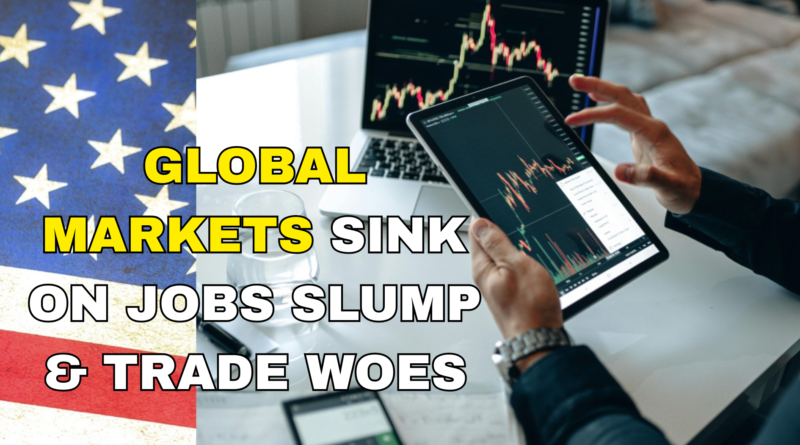GLOBAL STOCK MARKETS PLUNGE ON WEAK JOBS DATA AND TRADE TENSIONS
Markets React to Disappointing U.S. Jobs Report and New Tariffs on 66 Countries
Global stock markets fell sharply after two major economic developments shook investor confidence: a weak U.S. jobs report and the announcement of widespread new trade tariffs. The combination of poor job growth and rising trade tensions triggered a wave of selling across major stock exchanges in the United States, Europe, and Asia.
U.S. Jobs Report Misses Expectations
The U.S. Labor Department released the July employment report, showing that only 73,000 new jobs were added-much lower than the expected 185,000. This marks one of the weakest months for job growth in over two years. Analysts had hoped to see stronger hiring numbers that would indicate steady economic growth, but the figures suggest businesses may be cutting back on hiring due to rising costs and uncertainty.
The unemployment rate stayed at 4.1%, but many economists believe this does not reflect the full picture. Fewer people are actively looking for jobs, and wage growth has slowed. These trends raise concerns that the U.S. economy may be losing momentum after years of growth.
New Tariffs on Goods from 66 Countries
At the same time, the U.S. government announced sweeping new tariffs on imports from 66 countries, including key trading partners such as China, Germany, India, Brazil, and South Korea. These tariffs will affect products in sectors like electronics, machinery, textiles, and food. The move was justified by U.S. officials as a way to protect American industries and jobs, but many experts fear it could backfire.
International leaders reacted strongly. China promised to take “all necessary measures” in response, and the European Union said it would consider retaliatory tariffs. Global companies warned that the tariffs would increase production costs and reduce consumer spending.
U.S. Stock Markets See Major Declines
Investors reacted quickly to the double shock. The Dow Jones Industrial Average fell over 750 points, or about 2.3%, its biggest one-day drop since early 2024. The S&P 500 lost 2.1%, while the Nasdaq dropped 2.8% as tech stocks took heavy hits.
Shares of major companies like Apple, Microsoft, and Boeing led the losses. These firms depend heavily on global trade and international supply chains. If tariffs increase the cost of importing parts and materials, their profits could shrink.
Financial stocks also declined sharply. Weak job growth could delay future interest rate hikes by the Federal Reserve, which impacts bank earnings.
Asian and European Markets Also Tumble
The fallout wasn’t limited to the United States. Stock markets across Asia and Europe also dropped in response to the news. In Japan, the Nikkei 225 lost 2.5%, while Hong Kong’s Hang Seng Index fell 2.9%. South Korea’s KOSPI was down 2.7%, as its exporters face new hurdles in the U.S. market.
In Europe, the German DAX dropped 2.3%, France’s CAC 40 declined 2.1%, and the UK’s FTSE 100 lost 1.9%. Global investors are worried that escalating trade tensions could lead to a slowdown in global economic growth.
Investors Turn to Safe-Haven Assets
With stocks sliding, investors moved their money into safer assets. Gold prices rose to a 10-month high, while U.S. Treasury bond yields fell sharply as demand for bonds increased. The U.S. dollar weakened slightly, while the Japanese yen and Swiss franc gained strength, showing the shift to low-risk currencies.
Bitcoin and other cryptocurrencies also saw a small rise, as some investors viewed them as an alternative hedge against economic instability.
Economic Uncertainty Rising
The combined effect of disappointing jobs data and rising global trade tensions has increased fears of an economic slowdown or even a possible recession. Businesses may become more cautious about investment and hiring. Consumer confidence may also decline, especially if prices rise due to higher tariffs.
Economists warn that continued instability could derail recovery efforts in many parts of the world, especially in developing nations that depend on exports to the U.S. and Europe.
Government Response and Future Outlook
In Washington, political leaders are debating next steps. Some lawmakers are urging the administration to reconsider the tariffs, warning of economic damage. Others argue that the U.S. must stand firm to protect national industries.
Federal Reserve officials will be watching upcoming economic data closely. There is growing speculation that they may consider cutting interest rates again to support the economy if job growth continues to weaken.
Conclusion
The latest downturn in global stock markets highlights how closely linked economies have become. A single country’s decisions can now cause ripple effects worldwide. With weaker job growth in the U.S. and escalating trade tensions, both investors and policymakers face tough choices in the months ahead. The world will be watchin




